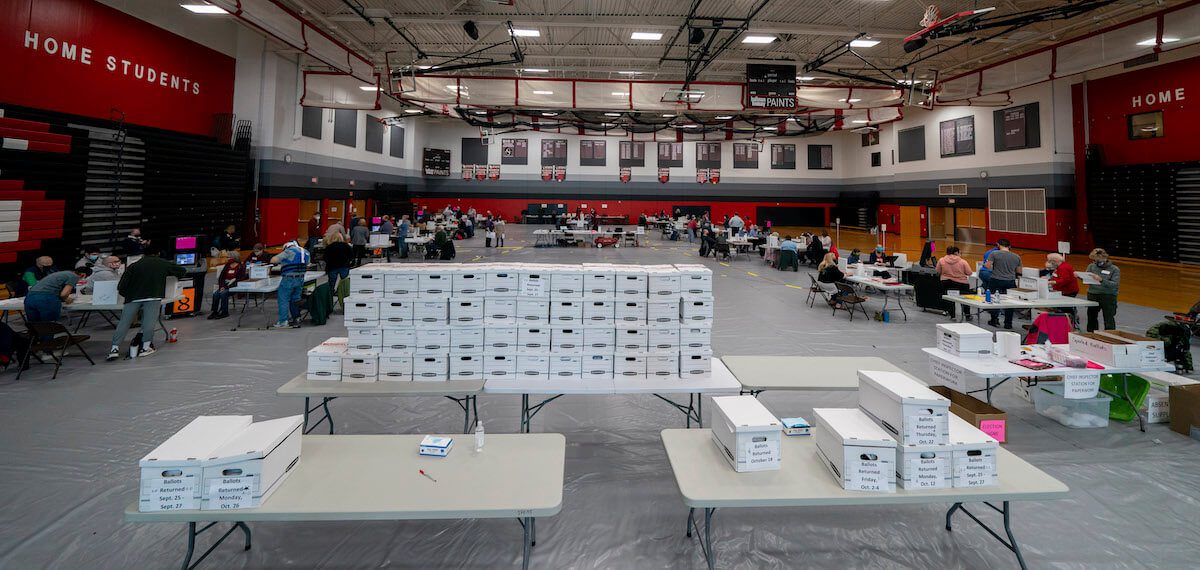
#image_title
Republicans fail to win supermajority in Legislature, even lose two Assembly seats in the Milwaukee suburbs.
Wisconsin is once again showing why it is a notorious swing state.
As of 6:30 a.m. Wednesday, unofficial election results show former Vice President Joe Biden winning the Badger State by fewer than 21,000 votes, according to the latest results from Reuters with 97% of expected votes counted.
This narrow victory comes four years after Wisconsin voters handed the state to President Donald Trump by fewer than 23,000 votes.
The nail-biter of a race kept political pundits and residents across the state up late into the night and back up again early Wednesday morning, as absentee votes were still being tallied in Wisconsin’s largest communities. But once the final results came in from Milwaukee, Brown, and Kenosha counties, President Trump’s initial lead disappeared.
Nationwide, results are still far from final in Pennsylvania, Georgia, North Carolina, and Michigan, states where ballot counting is taking longer and partially reflecting the growth of that state’s suburbs and their increasingly Democratic residents.
Early Wednesday morning, Biden told a crowd of supporters in Wilmington, Delaware, that “your patience is commendable.”
“We knew because of the unprecedented early vote and mail-in vote it was going to take awhile,” Biden said. “We are going to have to be patient until the hard work of tallying ballots is finished. And it ain’t over until every vote is counted, every ballot is counted.” But we’re feeling good about where we are.”
Meanwhile, Trump falsely claimed victory from the White House. He added “we’ll be going to the U.S. Supreme Court,” and “We want all voting to stop.”
Trump’s behavior demonstrates a reckless, unfounded attack on the electoral process, as no elected official has the ability to call for a race to be called prior to all votes being counted.
As of this morning, the political divide inside of Wisconsin appears to be deep as it was in 2016. Democratic strongholds like Milwaukee and Dane counties were bluer than they were in 2016, and the rural-urban divide was even more pronounced.
The election did not shift power in the State Legislature. While Republicans at one time had thought it was possible to win six seats—three in each chamber—to secure a veto-proof majority, that did not happen, and their agenda will be tempered by having Democrat Tony Evers in the governor’s office for at least two more years.
Democrat Brad Pfaff did pull off a victory in Senate District 32, defeating Republican Dan Kapanke by 589 votes. The La Crosse-area district was up for grabs following the resignation of Democrat Jennifer Shilling.
Sen. Patty Schachtner (D-Somerset), however, lost her seat to Republican challenger Rob Stafsholt in Senate District 10. Schachtner had won that seat in the 2018 special election by fewer than 2,000 votes.
Another tough loss for Democrats occurred in Senate District 30, with the defeat of Jonathon Hansen by Eric Wimberger. The defeat is the first time the Brown County district that includes Green Bay will be represented by a Republican in nearly two decades. Sen. Dave Hansen announced his decision to retire earlier this year and hoped his nephew would succeed him. The younger Hansen received more than $500,000 for his campaign, including over $400,000 from the Democratic Party of Wisconsin.

Wimberger raised less than $18,000 with no major contributions from the Republican Party of Wisconsin.
Democrats also were unable to flip central Wisconsin’s 24th Senate District from red to blue, with Sen. Patrick Testin (R-Stevens Point) defeating Paul Piotrowski.
Given the gerrymandered state Assembly maps that have protected Republicans for nearly a decade, it was notable that two GOP incumbents were unseated, demonstrating further evidence of a suburban shift nationwide.
Rep. Jim Ott (R-Mequon) was defeated by political newcomer Deb Andraca in the 23rd Assembly District, which includes some of Milwaukee’s North Shore suburbs and a swath of eastern Ozaukee County. The win by Andraca is significant because it represents an in-road for Democrats in the so-called “WOW” counties of Washington, Ozaukee, and Waukesha, which practically always vote in tandem, churning out relatively similar margins of victory for Republican candidates in every presidential election since 1964.
Andraca’s victory was likely propped up by the predominantly white, affluent North Shore Milwaukee County communities like Whitefish Bay and Fox Point, but Ozaukee County witnessed a big shift toward Democratic candidates in the presidential race as well.
With 99% of the precincts reporting, Biden managed an unheard-of 43.1% of the vote in Ozaukee County, the best showing for a Democratic presidential nominee since Harry Truman in 1948. Hillary Clinton managed just 37% of the Ozaukee County vote in 2016.
The Democratic gains in the WOW counties extended west as 14th Assembly District Rep. Robyn Vining (D-Wauwatosa), perhaps the most vulnerable Democratic incumbent, not only held on to her seat but won by a decisive 8-point margin. She won her first term in 2018 by just 0.4%.
Democrat Sara Rodriguez, a political newcomer, flipped the adjacent 13th Assembly District with 51% of the vote, unseating incumbent Rep. Rob Hutton (R-Brookfield).
The 13th and 14th Assembly Districts are split between western Milwaukee County and eastern Waukesha County. Biden took 38.8% of the vote in Waukesha County, a 5-point improvement over Clinton’s total in 2016.
The southern Milwaukee suburbs remained Republican, with vulnerable incumbent Reps. Ken Skowronski (R-Franklin) and Jessie Rodriguez (R-Oak Creek) holding on to their seats with 50.3% and 54.7% of the vote, respectively. Skowronski fended off Democrat Jacob Malinowski, a 23-year-old political newcomer who ran a slick social media-centric campaign, while Rodriguez bested Democratic South Milwaukee Mayor Erik Brooks.
Kenosha County, which flipped for Trump in 2016 by a margin of just 238 votes, broke further to the right for this election. Perhaps a reflection of Trump’s focus on Kenosha after the police shooting of Jacob Bake and ensuing unrest, the president increased his margin of victory tenfold, winning the county by 2,781 votes with 95% of precincts reporting.
Trump spent part of his final push of the presidential campaign in Kenosha, delivering a speech to thousands of supporters Monday night at the Kenosha Regional Airport less than 12 hours before polls opened.
Early signs looked even worse for Democrats in Kenosha, as it appeared incumbent Reps. Tip McGuire (D-Kenosha) and Tod Ohnstad (D-Kenosha) were in danger of losing their seats; however, the absentee vote totals from the city of Kenosha pushed them both to decisive victories early Wednesday morning.

Despite Democrats taking out hundreds of thousands of dollars in television and online ads against Assembly Speaker Robin Vos (R-Rochester), the state’s top Republican was buoyed by his gerrymandered district on his way to yet another landslide victory. He defeated Democrat Joel Jacobsen with 58.5% of the vote, dropping just 2.5% from his 2018 vote total.
The state Democratic Party, in a fundraising push late last month, claimed an internal poll showed Vos up just 5% over Jacobsen, but the party never released those figures. A true voting margin that close would have been unprecedented, as Vos has never won re-election by less than 17 points since the 2011 Republican gerrymandering.
Congressional winners included incumbents Democrats Ron Kind, Gwen Moore, and Mark Pocan, and Republicans Mike Gallagher, Glenn Grothman, Bryan Steil, and Tom Tiffany. Republican State Senate Majority Leader Scott Fitzgerald won the 5th District seat and will succeed retiring veteran Jim Sensenbrenner, kicking off a battle in the GOP caucus to see who will run that chamber of the Legislature.

New Biden rules deliver automatic cash refunds for canceled flights, ban surprise fees
In the aftermath of a canceled or delayed flight, there’s nothing less appealing than spending hours on the phone waiting to speak with an airline...

One year on the Wienermobile: The life of a Wisconsin hotdogger
20,000+ miles. 16 states. 40+ cities. 12 months. Hotdogger Samantha Benish has been hard at work since graduating from the University of...

Biden makes 4 million more workers eligible for overtime pay
The Biden administration announced a new rule Tuesday to expand overtime pay for around 4 million lower-paid salaried employees nationwide. The...

‘Radical’ Republican proposals threaten bipartisan farm bill, USDA Secretary says
In an appearance before the North American Agricultural Journalists last week, United States Department of Agriculture (USDA) Secretary Tom Vilsack...




